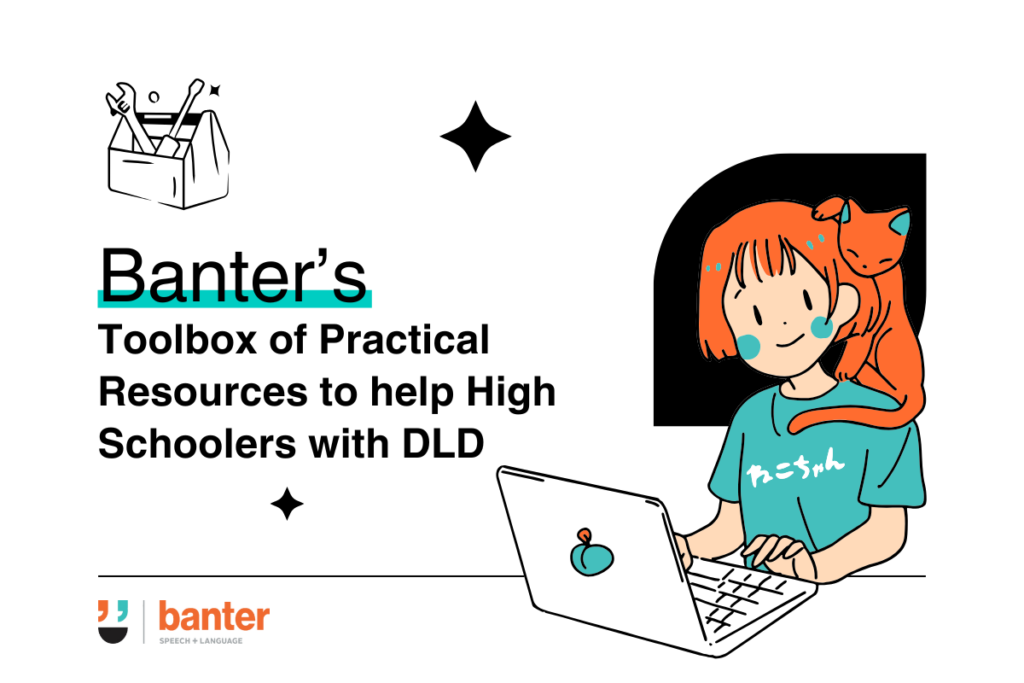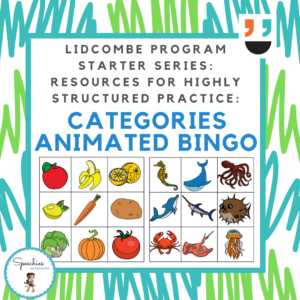Are you looking for practical help for a high schooler with Developmental Language Disorder? Check out our toolbox!
Big picture:
High schoolers with DLD have significant difficulties learning, understanding and using language. But DLD awareness is low in high schools, and existing supports are inadequate.
Why it matters:
Because of language challenges, many high schoolers with DLD encounter:
- academic difficulties with:
- focus, attention and organisation;
- learning and studying; and
- assignments, exams, and oral presentations;
- fatigue;
- social challenges with teachers, other students, and friends;
- emotional and mental health challenges; and
- stress about what comes after school.
What helps:
High schoolers with DLD benefit from:
- good sleep routines and healthy lifestyles;
- quiet classrooms;
- direct, explicit teaching of:
- academic vocabulary used across the curriculum (e.g. exam verbs);
- world knowledge;
- language and reading comprehension strategies;
- reading skills (including word recognition and fluency);
- writing skills (sentences, paragraphs, texts); and
- higher level oral language skills (e.g. metaphors, analogies, and idioms).
- teachers and other educators:
- giving short and clear instructions;
- not speaking too quickly;
- regularly checking student understanding;
- explicitly teaching subject-specific vocabulary; and
- using visual and other nonverbal supports;
- encouragement to participate in social activities and to explore interests; and
- good communication between students, parents, educators and SLPs about goals, strengths, barriers, and priorities.
Read more:
Wallmann, J., Sahlén, B., & Samuelsson, C. (2024). Developmental Language Disorder (DLD) in school – the experiences of different stakeholders. Acta Logopaedica, 1, 92–109. https://doi.org/10.58986/al.2024.18598

Banter’s Toolbox of Practical Resources to help High Schoolers with DLD
1. Practical school strategies
How to help a disorganised student: some practical ideas and resources
How to help our secondary teachers support teenagers with language disorders at school
2. Practical help with vocabulary, world knowledge and higher level language
Interactive Oral Language Workouts for High School Students
Which words should I teach to a high school student with a small vocabulary?
For reading, school and life success, which words should we teach our kids? How should we do it?
Five ways to help 11-14 year-old students to improve their vocabularies for school and life
Light up language: higher level language overviews
3. Practical help with meaningful word parts
Why I teach reluctant writers about high-frequency prefixes, suffixes and bases
Oral Language Workbook: Morphological Awareness Program for High Schoolers
4. Practical help with sentence writing
Start Your Engines: How to Write Simple Sentences
The FANBOYS Cup: How to Write Compound Sentences
How to Write Complex Sentences
Don’t skimp on complex sentence work when teaching students to listen, speak, read, and write
Teaching students about text types won’t – on its own – make them good writers
5. Practical help with writing different text types
Persuasive Writing Foundations
To help teenagers with language challenges, we need to go beyond words and sentences
Stories help students to understand and remember new information. Here’s why.
Persuasive writing is about much more than PEEL, TEEL, NAPLAN, the HSC – or any other acronym!
6. More practical help with writing difficulties
Is your teenager a Reluctant Writer? A free ebook to help
11 Ways to Improve Writing Assessments
Rally Writers simple, compound and complex sentence writing courses, by Banter Speech
Banter Speech’s Explicit Writing Program: Think, then Write
7. Practical help with significant reading challenges (including dyslexia)
Too many children can’t read. We know what to do. But how should we do it?
Banter’s Remedial Reading Program (back-to-basics)
Breaking the vicious circle for older kids with reading problems: how to help
“I’m not a child!” How to get help for a teenager or adult you love who can’t read
The forgotten reading skill: reading fluency
8. Practical help with study skills
9. Practical Help with problem solving
10. More on language comprehension
Oral language comprehension: what is it? A plain English explainer
Five ways to boost your child’s oral language and reading comprehension skills with sequencing
6 strategies to improve your child’s reading comprehension
“I don’t understand what I’m reading” – reading comprehension problems (and what to do about them)
11. Parent support for increased social inclusion and participation
Parents of teenagers aged 13 – 15 years: 10 ideas to increase participation and communication skills
Parents of teenagers aged 16-18 years: 11 ideas to increase participation and communication skills
12. Enough sleep and quiet classrooms
Why enough sleep is essential for speech and language learning
“I can’t hear myself think!” The compelling case for quiet classrooms
This article also appears in a recent issue of Banter Booster, our weekly round up of the best speech pathology ideas and practice tips for busy speech pathologists, speech pathology students and others.
Sign up to receive Banter Booster in your inbox each week:

Hi there, I’m David Kinnane.
Principal Speech Pathologist, Banter Speech & Language
Our talented team of certified practising speech pathologists provide unhurried, personalised and evidence-based speech pathology care to children and adults in the Inner West of Sydney and beyond, both in our clinic and via telehealth.















 (S106) Lidcombe Program Starter Series: Resources for Highly Structured Practice: Categories Animated Bingo
(S106) Lidcombe Program Starter Series: Resources for Highly Structured Practice: Categories Animated Bingo